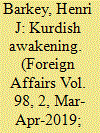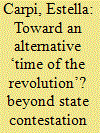| Srl | Item |
| 1 |
ID:
163311


|
|
|
|
|
| Summary/Abstract |
We’ve been fighting for a long time in Syria,” said U.S. President Donald Trump in the last days of 2018. “Now it’s time for our troops to come back home.” The president’s surprise call for a rapid withdrawal of the nearly 2,000 U.S. troops stationed in Syria drew widespread criticism from members of the U.S. foreign policy establishment. But it came as an even greater shock to the United States’ main partner in the fight against the Islamic State (or ISIS), the Syrian Kurds. For weeks prior to the announcement, Turkish President Recep Tayyip Erdogan had been threatening to invade areas of northern Syria controlled by Kurdish militants. The only thing stopping him was the presence of U.S. troops. Removing them would leave the Kurds deeply exposed. “If [the Americans] will leave,” warned one Syrian Kurd, “we will curse them as traitors.”
|
|
|
|
|
|
|
|
|
|
|
|
|
|
|
|
| 2 |
ID:
160073


|
|
|
|
|
| Summary/Abstract |
The convoluted relationship between the state and citizens in conflict-ridden Syria often has been reduced to a binary of dissent and consent. Challenging these simplistic categorizations, this article analyzes how state mechanisms resonate in the everyday lives of Syrians since the beginning of the crisis. Drawing on ethnographic insights from Syrian refugees in Lebanon and Syrian Kurds in northeastern Syria, this article shows how state, society and political opposition function as relational processes. Then, it identifies the limitations of contemporary strategies of everyday political contestation through the theory of Syrian intellectual ‘Omar ‘Aziz’s ‘time of the revolution.’
|
|
|
|
|
|
|
|
|
|
|
|
|
|
|
|